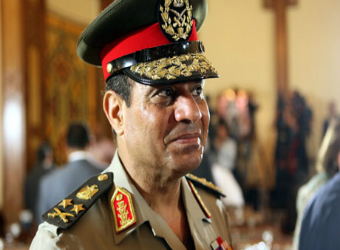Egypt’s army chief called on Tuesday for a quick transition to elections in order to restore stability to the country, while supporters of the Islamist president he ousted, Mohamed Morsi, staged daring protests urging an end to “military government”.
Egypt has been gripped by turmoil since the army removed Morsi on July 3 following mass protests against his rule.
Political tensions and a sharp rise in attacks by Islamist militants have decimated tourism and investment in Egypt, the most populous Arab state, which depends heavily on U.S. aid.
Speaking to soldiers and police officers at a seminar, army chief Abdel Fattah al-Sisi “called on everyone to be truly aware of the size of the problems facing society, and which necessitate speeding up the end of the transitional phase,” the army spokesman’s official Facebook page said.
In a reference to Morsi’s year in power, Sisi condemned what he said were attempts to distort “a ruling experience that failed to meet the demands of the Egyptian people” and portray it as a “religious battle and a war on Islam.”
After toppling Morsi, the military installed an interim government and announced a “road map” for a transition to a new election. The Muslim Brotherhood accused the military of staging a coup that removed Egypt’s first freely elected president.
Foreign Minister Nabil Fahmy said last week that the transitional phase of government should end “by next spring.”
Since Morsi’s downfall, security forces have killed hundreds of pro-Morsi protesters, and senior members of his Muslim Brotherhood have been arrested, actions that drastically reduced the size of protests.
Morsi supporters protested in Cairo’s Tahrir Square on Tuesday for the first time since the army forced him from office in July, risking the wrath of security forces who had been keeping a close eye on the area.
About 100 protesters gathered in the square, chanting, “Down with the military government!”
“We are a country not a military camp,” the Morsi supporters shouted in Tahrir, which was the rallying point in 2011 for hundreds of thousands of people against former President Hosni Mubarak. “We want freedom!” they said.
Shortly after arriving in Tahrir, passersby attacked them with rocks. Riot police then moved in and dispersed the crowd.
SEEKING RECONCILIATION
At talks this week, European Union foreign policy chief Catherine Ashton will encourage reconciliation between the government and the Brotherhood, a European diplomatic source said.
“She is coming to explore the possibilities for a return to a transition in which all sides can participate,” the European diplomat said in Cairo. Ashton arrived on Tuesday.
“Things are still not completely black and white, although the situation is extremely difficult and reconciliation is becoming a difficult word in Egypt.”
Getting the army-backed government and the Brotherhood to compromise may be an impossible mission for Ashton, who failed on a previous visit, as did several Western envoys, to persuade the military to avoid using force against Morsi’s supporters.
Security forces crushed pro-Morsi protest camps on August 14, killing hundreds of people.
The Brotherhood’s leaders were arrested in a bid to decapitate the movement, which won every election in post-Mubarak Egypt. A court has now banned the movement and ordered its assets frozen.
The European diplomat said Ashton would meet government leaders, Sisi and Muslim Brotherhood politicians Amr Darrag and Mohamed Ali Bishr, who both served as negotiators for the movement in talks with U.S. and EU envoys that failed to prevent the bloody raids on protest camps.
Most Brotherhood leaders are in jail, including Morsi.
A security source said Ashton would likely encourage the Egyptian government to overturn a court ruling that outlawed the Brotherhood and gradually release its leaders from prison on condition they acknowledge that popular protests ultimately removed Morsi, not a coup.
Ashton is expected to explore whether there is still room for an initiative that Deputy Prime Minister Ziad Bahaa el-Din, a liberal, put to the Cabinet in August.
The proposal called for an immediate end to the state of emergency, political participation for all parties and guarantees of human rights, including free assembly.
“This is one of the possibilities that should be explored,” the diplomat said.
Source: Reuters
